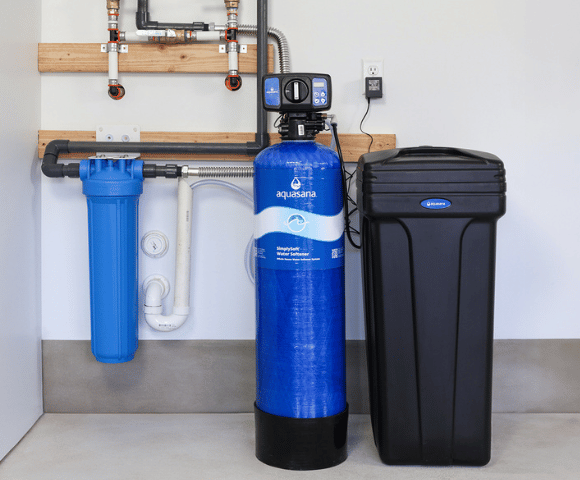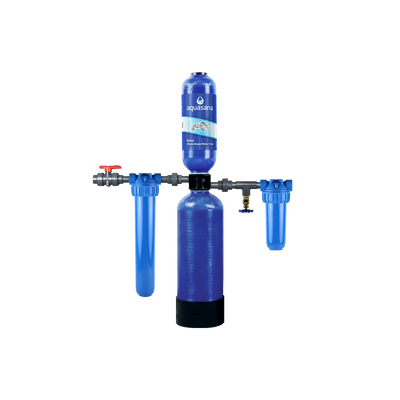When do you need a water softener?
If hard water is causing issues in your home, you are not alone. The U.S. Geological Survey (USGS) estimates that about 85% of homes in the U.S. have hard water. Some of the signs are easy to spot, like the residue on your dishes or glasses. If you notice spots or streaks on your freshly washed kitchenware, it’s probably due to these hard minerals in the water.
You might also see a chalky residue in your bathroom — on the sink, shower walls, or bathtub. This buildup happens because hard water doesn’t rinse away soap as well, leaving behind a film.
Hard water can even affect your skin and hair, making them feel dry and stripped of natural oils. If your hair feels brittle or your skin is irritated after a shower, hard water could be to blame.
Hard water also impacts your appliances. Over time, limescale buildup can make dishwashers, washing machines, and water heaters less efficient and reduce their lifespan by making them work harder. This same buildup can happen in your pipes, potentially causing clogs and expensive repairs.
To find out if you have hard water, you can use a home water test kit or check your local water provider’s quality report. Water is usually considered “hard” if it has more than 3 grains per gallon (gpg) or about 51 milligrams per liter (mg/L) of minerals. If your water falls into this range, you may need a water softener to address hard water.
Top benefits of a water softener in your home
There are numerous benefits to installing a water softener in your home. Here are the top reasons to get a softener:
1. Improves appliance lifespan and efficiency
As mentioned earlier, the minerals in hard water can lead to a buildup commonly known as limescale. Over time, this buildup accumulates inside appliances like dishwashers, washing machines, and water heaters, forcing them to work harder and reducing their efficiency. This not only increases energy consumption but also raises the risk of wear and tear.
A water softener helps prevent these minerals from building up in your appliances, allowing them to operate more efficiently. By reducing strain on your appliances, you can lower energy use, save on utility bills, and avoid costly repairs or replacements down the road.
2. Cleaning products are more effective
The minerals in hard water can interfere with soaps and detergents, making them less effective. If you have hard water, you’ve probably noticed that soap doesn’t lather as well, which means you end up using more product than necessary.

Whether it’s dish soap, laundry detergent, or general cleaning products, hard water forces you to use more to get the job done. This can be both frustrating and expensive. Installing a water softener can save you up to nearly $500 a year* by improving your appliance efficiency, minimizing repairs, and reducing soap and cleaning products.
A water softener removes the calcium and magnesium in hard water, allowing your cleaning products to dissolve properly and work as they should. With a water softener, you’ll find that your cleaning products are more effective, your laundry feels softer, your dishes and glassware come out spotless, and you’ll need less soap overall.
3. Provides spotless glasses and dishes
As mentioned earlier, one of the most noticeable signs of hard water in your home is spotted or streaked dishes, glasses, and utensils. The minerals in hard water are tough to rinse away, often leaving behind a cloudy film or pale white spots even after a thorough wash.
With a water softener, these minerals are removed, allowing soap to rinse off more effectively. Your plates and glasses will come out spotless and sparkling, with no more frustrating residue. You can finally reach for a clean glass without worrying about unsightly spots or streaks.
4. Reduces color fading and creates stiffness in laundry
Hard water doesn’t just impact your appliances and skin — it’s tough on your clothes, too. The calcium and magnesium in hard water can cling to fabrics, causing colors to fade quickly and leaving your laundry feeling stiff. Just like with dishes, you may notice chalky white mineral deposits on clothes after coming out of the washer. Over time, these minerals can even weaken fabric, leading to holes in your clothes.
A water softener removes these harsh minerals, allowing your laundry detergent to work more effectively. As a result, your clothes will feel cleaner, softer, and colors will stay vibrant. A water softener helps preserve your wardrobe, keeping your clothes looking and feeling better for years to come.
5. Enhances water taste
Even if you use a water filter for drinking water, hard water’s harsh minerals can still affect the taste. These minerals can give water a bitter, salty, metallic flavor, which can impact not only the water you drink straight from the faucet but also the taste of your coffee, tea, or meals prepared with water. While this chalky flavor is not harmful, it is far from pleasant.
A water softener removes these bitter minerals, leaving your water tasting cleaner and more refreshing, making every sip and everything you cook taste better.
6. Protects against pipe bursts
Hard water can cause serious and expensive problems for your home’s plumbing system. To start, the minerals in hard water react with the metal surface in your pipes which leads to rust and corrosion. Additionally, hard water creates limescale buildup in pipes that restricts water flow. When pipes get clogged to a point where water flow is severely restricted, it creates a pressure buildup that can cause pipes to burst.
Water softeners help prevent these issues which can lead to costly repairs, giving you peace of mind and protecting the overall health of your home.
7. Increased water pressure
The same clogs that lead to pipe bursts can also reduce your water pressure. As calcium and magnesium accumulate in your pipes, they restrict water flow, leading to lower pressure. A water softener removes these minerals, preventing buildup over time and keeping your water flowing steadily. With a water softener, you’ll notice improved water pressure, making for better showers, stronger faucet flow, and more efficient water use throughout your home.

8. Helps skin and hair health
One of the most noticeable effects of hard water is how it impacts your skin and hair. The calcium and magnesium in hard water can strip away the natural oils that protect your skin and hair. After showering, you might find your hair feeling brittle or dry, and your skin irritated, itchy, or prone to breakouts. While lotions and conditioners can provide temporary relief, a water softener offers a long-term solution.
By removing these harsh minerals, a water softener leaves you with water that’s gentler on your body. Soft water helps preserve your natural oils, leaving your hair and skin feeling healthier and more nourished. This simple change can have a big impact on your daily routine, making showers more enjoyable and beneficial for your skin and hair.
Address hard water in your home
If you’re among the many homeowners dealing with the effects of hard water, a water softener is an excellent solution to help alleviate the challenges. You’ll notice dramatic improvements in your hygiene, appliances, kitchenware, and overall peace of mind.
Aquasana’s SimplySoft® Grain Softeners are a great solution if you’re in the market for a system. Available in 40k and 60k capacities to suit homes of all sizes, our softeners are IAPMO certified to NSF/ANSI Standard 44 for the reduction of water hardness so you can feel confident about the protection you’re getting. In addition to the benefits above, our softeners also use 50% less salt and generate 28% less wastewater than traditional softeners*, making them a better value and more eco-friendly.
WHOLE HOUSE WATER SOFTENER
SimplySoft® 40,000 Grain Softener
Reduces minerals that cause hard water, providing softer, scale-free water from every tap in your home.
.png)
* Potential savings based on Water Quality Research Foundation Battelle Institute Study.
**Based on metered operation mode compared to standard time-based regenerated softeners.


